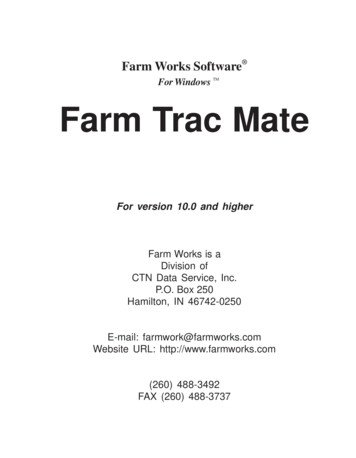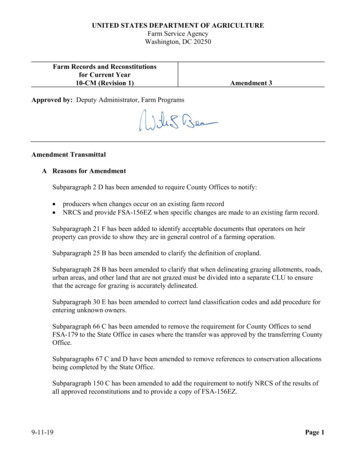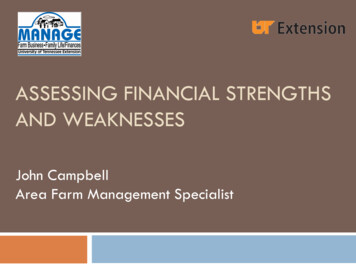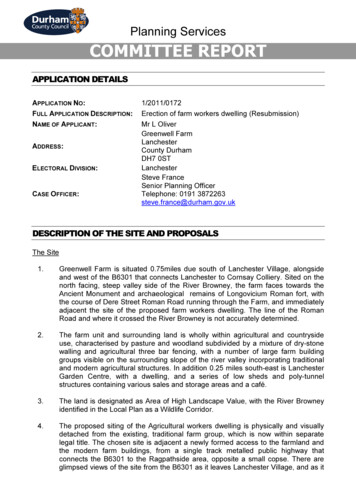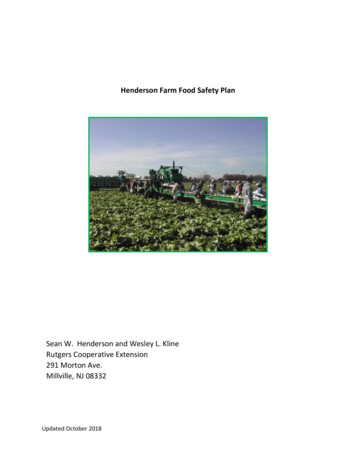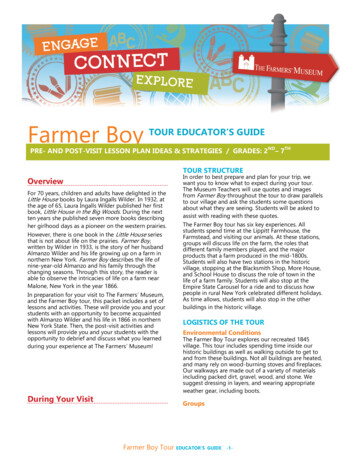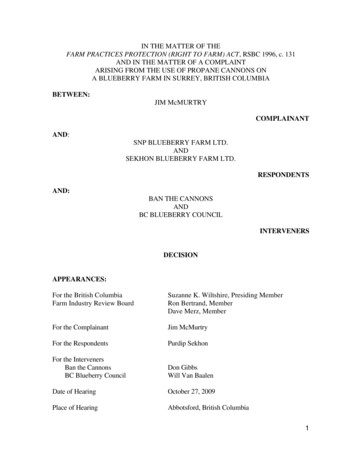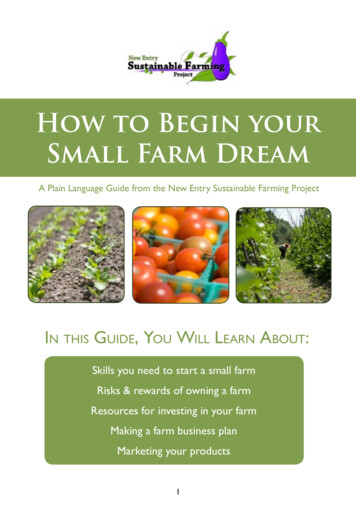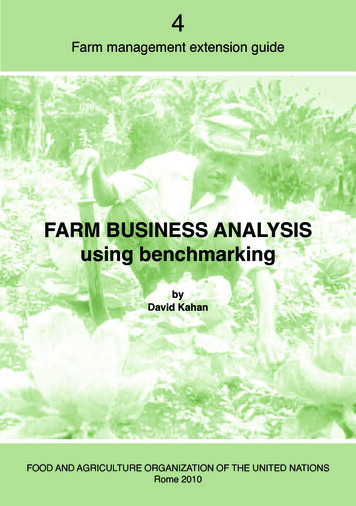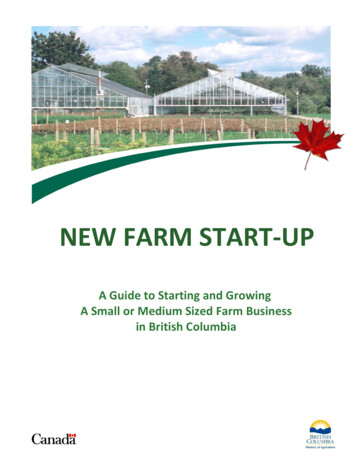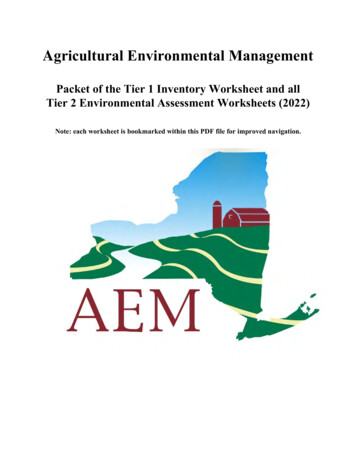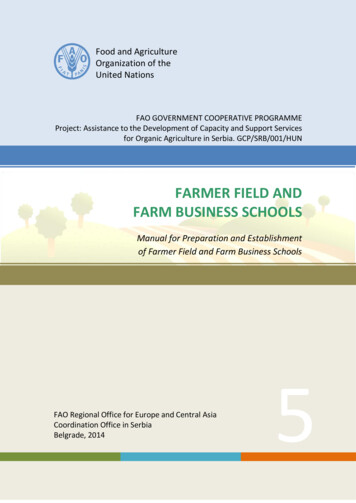
Transcription
Food and AgricultureOrganization of theUnited NationsFAO GOVERNMENT COOPERATIVE PROGRAMMEProject: Assistance to the Development of Capacity and Support Servicesfor Organic Agriculture in Serbia. GCP/SRB/001/HUNFARMER FIELD ANDFARM BUSINESS SCHOOLSManual for Preparation and Establishmentof Farmer Field and Farm Business SchoolsFAO Regional Office for Europe and Central AsiaCoordination Office in SerbiaBelgrade, 20145
ii
ContentsForeword v1. Understanding Farm Field School . 12. Historical Background. 13. The FFS as alternative source for providing extension services . 24. Characteristics of the Farmer Field School approach . 35. Objectives of the FFS . 56. FFS Principles . 57. Farmer Field School core activities. 77.1 Agro-Ecosystem Analysis (AESA) . 77.2 Field Comparative Experiments . 87.3 Facilitation of special topics – Topic of the day . 97.4 Participatory monitoring and evaluation (PM&E) . 97.5 Group Dynamic Exercises .108. Understanding Farm Business School.108.1 What is FBS .108.2 Why FBS .118.3 Aim of FBS .119. Business School programme implementation process .1310. FBS phases .1511. Non-Formal Education Methods .1612. Facilitation .1713. Report writing .1914. Groups .2015. Team Building .21PRACTICAL EXCERCES .241. Establishment of a Core Team of Trainers (CTT) .242. Training of Trainers (ToT).243. Organization TOT .244. Considerations in establishing of PTDS .295. Steps in establishing PTD in TOT and FFS sites .296. Organisation of the Farmer Field School.326.1 Phase Ground working or preparation .326.2 Phase - training of facilitators/Lead farmers (TOF) .336.3 Phase - establishment and running of FFS .367. How to conduct AESA .428. Group dynamic exercises .489. Developing PM&E plan.4910. Organization of field days .5111. Exchange visits .5212. Graduation .5213. Phase post harvesting cycle .5214. Preparation and establishment of FBS .5315. Types of non-formal education approaches used in FFS .5416. Writing report.5717. Tips and exercise for group - teamwork .58iii
iv
ForewordThe publication “Manual for Preparation and Establishment of Farmer Field and FarmBusiness Schools” is intended to be used by the stakeholders in organic sector in Serbia.It has been developed within the framework of the UN FAO Project GCP/SRB/001/HUN:“Assistance to the Development of Capacity and Support Services for Organic Agriculturein Serbia“, implemented by FAO and financed by Hungarian Ministry of Agriculture. Theproject is implemented in coordination with the Ministries of Agriculture and the Ministryof Education of Serbia.The project aims to improve capacity of farmers and other value chain stakeholders inorganic market oriented value chains through participatory training in farmer fieldschools and farmer business schools. That is further supported by strengthening of Centerfor Organic Production in Selenca which has been empowered to provide training andfacilitation of market linkages and business development. Project visibility and awarenessabout organic agriculture was enhanced by numerous activities and publicity work ofNational Association for Organic Agriculture Serbia Organica.Broader base of competences for organic agriculture has been supported by upgradingsecondary education curricula for organic agriculture and inclusive practical training ofteachers and high school students. Overall institutional environment for inclusive organicvalue chain development will be strengthened by participatory formulation of Nationalprogramme for capacity development and provision of support services for regionspecific organic production development.The materials produced within the framework of the project have been tested andvalidated during the workshop and training sessions.“Manual for Preparation and Establishment of Farmer Field and Farm Business Schools”was prepared by Zhupan Martinovski.We gratefully acknowledge contributions of all participants and principal authors, as wellas all project team members: Aleksandar Mentov, National Project Manager; Olga Keseljand Bratislav Stamenkovic, National Consultants; Zhupan Martinovski and VladislavPopov, International Consultants; Gyongy Kurthy, International Team Leader; as well asNevena Aleksandrova and Stjepan Tanic from FAO Regional Office for Europe and CentralAsia for their technical guidance and supervision of project implementation.v
vi
1. Understanding Farm Field SchoolFarmer Field Schools (FFS) are based on an innovative,participatory and interactive learning approach. Itemerged as a way for small-scale farmers to investigateand learn how to acquire required skills for qualityproduction technologies and marketing techniques.Although the programme and activities for each FFS aredifferent, the common aim is towards the sustainability ofthe group and the implementation and dissemination ofthe lessons learned. The lessons learned will help thefarmers to become better decision makers, and to betterreact to market requirementsThis FFS manual has the purpose to help the farmersengaged in organic production and who are ready tocooperate in development of Farmer Field School through provision of information andpromotion of Farmer Fields School methodology, establishment and functioning.This Manual is a support tool for creating awareness of the FFS methodology and fordeveloping a training programme to Business Development Service partners and selectedextensionists within the project (through a Core Team of Trainers), who can then train farmleaders in the FFS methodology.This manual describes the FFS methodology, introduces the guiding principles, and suggestshow to organize the overall programme and farmer groups.The FAO staff, BDS providers (Centres for Organic Production) and Leader Farmers, incoordination, shall contribute for the creation on additional training materials towards achievingsustainable production groups market oriented. These guidelines shall provide the new FFSfacilitators (Lead Farmers) with a course of action and specific examples to assist them increating activities to enhance participation, promote experimental approaches and facilitatelearning of organic farming topics.The topics could be adapted to the specific needs of each FFS, relying on existing knowledge,as well on available local and international experience.The manuals and guidelines will facilitate the BDS providers and Lead Farmers in theiractivities in support of the Farm Field Schools established during and beyond the projectduration.2. Historical BackgroundThe FFS approach was developed by a FAO project in 1989 in South East Asia as a way forsmall-scale rice farmers to investigate, and learn, for themselves the skills required for, andbenefits to be obtained from, adopting on practices in their paddy fields. The Government ofIndonesia’s response was to launch an emergency training project aimed at providing 120,000farmers with field training in Integrated Pest Management (IPM), focused mainly on recordingon reducing the application of the pesticides that were destroying the natural insect predatorsof the brown plant hopper.It was based not on instructing farmers what to do but on empowering them through educationto handle their own on-farm decisions, using experiential learning techniques developed fornon-formal adult education purposes.The FFS approach is replicated in variety setting in various FAO projects, but as well incooperation between FAO/UNDP (Soil Fertility Management), IFAD/FAO poultryproduction, FAO/ILRI dairy production, etc. From agriculture the same approach is spread to1
natural resource management (soil fertility, water conservation, etc.) and to Socio-culturaldimensions of community life (food security & nutrition, savings, health, literacy training,livelihoods, etc.). The FFS approach was already applied in Vojvodina within the frameworkof FAO project on combating Western Corn Rootworm.3. The FFS as alternative source for providingextension servicesThe traditional way of transferring technologies to farmers by extension service providers hasproved inadequate in complex situations when faster and bigger changes, during the growingand vegetation period, are required. In many cases, this approach of giving services “top-down”was complex and expensive for small farmers.Furthermore, farmers in transition and developing countries are characterized by a lack ofproper involvement in identifying problems, evaluating and implementing possible solutions.There is also a trend of traditional extension service providers to become less financed by thegovernments and more commercial in regards to the services offered. This situation raises theneed for alternative methods to help farmers in facing/adopting of new production technologiesand to be capable to solve eventual problems in their production.The FFS is an alternative approach that focus onstrengthening farmer’s and the rural communities’capacity in analysis of their production and inidentifying their main constraints, as well as testingpossible solutions by themselves. By adding theirown knowledge to existing information, farmerseventually identify and adopt the most suitablepractices and technologies to their farming system. Inthis view, they are in position to become moreproductive, profitable and responsive to changingconditions.FFS is a capacity building method based on adulteducation principles using groups of farmers. Thefarmers learn through observation andexperimentation in their own fields, allowing themto improve management skills and becomeknowledge experts on their own farms. Throughusing experiential and participatory learning techniques, the process of learning could solve theproblem of lack of proper advice given by extension workers. Farmers are encouraged to handletheir own on farm decisions in which they apply previous experiences and test newtechnologies. FFS is also known as “School without walls” for improving decision makingcapacity of farming communities and stimulating local innovation for sustainable agriculture.They make a choice in the production methods through discovery based approach.A FFS is a dynamic process, not a goal. It aims to increase the capacity of farmers to test newtechnologies in their own fields and assess results and their relevance to particularcircumstances. Farmers interact with researchers and extension workers on a demand drivenbasis, only asking for help where they are unable to solve a problem themselves. This dynamicprocess is practiced, controlled and owned by the farmers helping them to transform their2
observations and to create a better understanding of their production system. FFS enables agroup of farmers to test alternative solutions and take the risk of experimenting newtechnologies.In summary, FFS is a forum where farmers and trainers debate observations, apply theirprevious experiences and present new information from outside the community. The results ofthe meetings are management decisions on what action to take. Thus FFS as an extensionmethodology is a dynamic process that is practiced and controlled by the farmers to transformtheir observations to create a more scientific understanding of the crop / livestock agroecosystem.4. Characteristics of the Farmer Field Schoolapproach4.1 Farmers as ExpertsFarmers carry out for themselves the various activitiesrelated to the particular farming practice during whichpractice they want to study and learn about. This couldbe related to annual crops, or livestock/fodderproduction. The key thing is that farmers conduct theirown field studies. Their training is based on comparisonstudies (of different treatments) and field studies thatthey, not the extension/research staff conduct. In sodoing they become experts on the particular practice they are investigating.4.2 The Field is the Learning PlaceAll learning is based in the field. The maize field, grape pools, or grazing area is wherefarmers learn. Working in small subgroups they collect data in the field, analyse thedata, make action decisions based on they analyses of the data, and present theirdecisions to the other farmers in the field school for discussion, questioning andrefinement.4.3 Extension Workers as Facilitators Not TeachersThe role of the extension worker is very much that of a facilitator rather than aconventional teacher. Once the farmers know what it is they have to do, and what it isthat they can observe in the field, the extension worker takes a back seat role, onlyoffering help and guidance when asked to do so.Presentations during group meetings are the work of the farmers not the extensionworker, with the members of each working group assuming responsibility forpresenting their findings in turn to their fellow farmers. The extension worker may takepart in the subsequent discussion sessions but as a contributor, rather than leaders, inarriving at an agreed consensus on what action needs to be taken at that time.4.4 Scientists/Subject Matter Specialists Work With Rather than Lecture FarmersThe role of scientists and subject matter specialists is to provide backstopping supportto the members of the FFS and in so doing to learn to work in a consultative capacitywith farmers. Instead of lecturing farmers their role is that of colleagues and adviserswho can be consulted for advice on solving specific problems, and who can serve as asource of new ideas and/or information on locally unknown technologies.4.5 The Curriculum is integratedThe curriculum is integrated. Crop husbandry, animal husbandry, horticulture, landhusbandry are considered together with ecology, economics, sociology and educationto form a holistic approach. Problems confronted in the field are the integratingprinciple.3
4.6 Training Follows the Seasonal CycleTraining is related to the seasonal cycle of the practice being investigated. For annualcrops this would extend from land preparation to harvesting. For fodder productionwould include the dry season to evaluatethe quantity and quality at a time of yearwhen livestock feeds are commonly inshort supply. For tree production, andconservationmeasuressuchashedgerows and grass strips, trainingwould need to continue over several yearsfor farmers to see for themselves the fullrange of costs and benefits.4.7 Regular Group MeetingsFarmers meet at agreed regular intervals. For annual crops such meetings may be every1 or 2 weeks during the cropping season. For other farm/forestry management practicesthe time between each meeting would depend on what specific activities need to bedone, or be related to critical periods of the year when there are key issues to observeand discuss in the field.4.8 Learning Materials are Learner GeneratedFarmers generate their own learning materials, from drawings of what they observe, tothe field trials themselves. These materials are always consistent with local conditions,are less expensive to develop, are controlled by the learners and can thus be discussedby the learners with others. Learners know the meaning of the materials because theyhave created the materials.Even illiterate farmers can prepare and fuse simple diagrams to illustrate the points theywant to make.4.9 Group Dynamics/Team BuildingTraining includes communication skills building, problem solving, leadership anddiscussion methods. Farmers require these skills. Successful activities at thecommunity level require that farmers can apply effective leadership skills and have theability to communicate their findings to others.Farmer Field Schools are conducted for the purpose of creating a learning environmentin which farmers can master and apply specific land management skills. The emphasisis on empowering farmers to implement their own decisions in their own fields.4
5. Objectives of the FFS“FFS is not about technology but about people development and initiating group actions. Itbrings farmers together for them to assess their problems and seek ways of addressing them.”Specific FFS objectives include: empowering farmers with knowledge and skills tomake them experts in their own fields; sharpening the farmers’ ability to make critical andinformed decisions so that they can make theirfarming profitable and sustainable; sensitising farmers to new ways of thinking andproblem solving; helping farmers learn how to organize themselves andtheir communities; enhancing the relationships between farmers,extensionists and researchers, so they work togetherto test, assess and adapt a variety of options withinthe specific local conditions;6. FFS PrinciplesThe four major principles within the FFS processare:a) Grow a healthy enterprise;b) Observe fields/cattle regularly;c) Conserve natural enemies of crop pests;d) Farmers understand ecology and become experts intheir own field;Every FFS is guided by the following principles:6.1 LEARNING BY DOINGAdults do not change their behaviour and practices just because someone tells them whatto do. They learn better through experience than from passive listening at lectures ordemonstrations. Discovery-based learning enables the farmers:to develop a feeling of ownership, and- to gain the confidence that they are able to reproduce the activities and results ontheir own farm.6.2 FARMER-LED LEARNING ACTIVITIESFarmers together with the Lead Farmer, not the BDS provider, decide:- what is relevant to them and what they want the FFS to address;- if the information is relevant and tailored to their actual needs;- the facilitator simply guides the farmers through their learning process by creatingparticipatory exercises to provide farmers with new experiences.6.3 LEARNING FROM MISTAKESEvery change in the production and marketing techniques, as well in behaviour of the FFSmembers, requires time and patience. Learning is an evolutionary process characterized byfree and open communication, confrontation, acceptance, respect and the right to make5
mistakes. The right to make mistakes is the key as people more often learned from mistakesthan from successes. Each person’s experience of reality is unique.6.4 LEARN HOW TO LEARNWhy not teaching, but learning Adults learn by hands onexperience, things related today to day life Adults should be encouraged todiscover for themselves Retention rate in adults is asbelow- 20% when they hear6.5 PROBLEM-POSING/PROBLEM-SOLVING- 40% when they see- 80% when they discoverProblems are presented as challenges, not Child education is likeconstraints. Farmer groups learn different analyticalfilling an empty cup withmethods to help them gain the ability to identify andtea while adult education issolve any problem they may encounter in the field.like stirring to blend theingredients Experience has it that6.6 THE FARMER’S FIELD IS THE LEARNING- When you hear you forget- When you see you rememberGROUND- When you discover you ownThe field (crop production system) is the main learning tool.itAllfor activitieslifeare organizedFarmers are learning the necessary skills:- to improve their ability to observe and analysetheir own problems;- to make conscious decisions;- learn how they can educate and developthemselves further;around it. Farmers learn directly from what they observe, collect and experience in theirfields instead of text books, pictures or other extension materials.Farmers also produce their own learning materials (drawings, etc.) based on what theyobserve. The advantages of these home-made materials are:- they are consistent with local conditions;- inexpensive to develop;owned by the farmers.6.7 LEAD FARMERS ARE FACILITATORS, NOT TEACHERSThe project will train the selected LeadFarmers to take the role of facilitatorsat FFS. Their role is to guide thelearning process and not to teach. Thefacilitatorcontributestothediscussions and aims to reachconsensus on what actions need to betaken.Extension specialists and Researchersare invited to provide technical andmethodological backstopping supportto an FFS and also learn to work in aparticipatory and consultative waywith farmers.6.8 UNITY IS STRENGTHEmpowerment through collective action is essential. Farmers united in a group have morepower than individuals. Also, when recognized as an active member within a group, thesocial role of individuals within a community is enhanced.The combination of two or more minds is often more successful than one mind on its own.6
The FFS expresses this as 1 1 3, i.e. one mind one mind creates a new, third mind.6.9 EVERY FFS IS UNIQUELearning topics within the FFS should be chosen by the community. Training activitiesmust be based on existing gaps in the community’s knowledge and skills and should alsotake into consideration its level of understanding.Every group is different and has its own needs and realities. As participants develop theirown content, each FFS develop itself in unique organization.6.10 SYSTEMATIC TRAINING PROCESSAll FFS follow the same systematic training process.The key steps are:- observation;- group discussion;- analysis;- decision making, and- action planning.The FFS experience has shown that the best results are achieved with weekly meetings.Longer gaps can slow down the learning process. The length of the FFS cycle depends onthe focal activity. Crop based FFS usually base their length on the cycle of production: fromproduction planning, land preparation to harvesting and post-harvest activities.FFS increasingly include marketing and processing activities which may lengthen the FFSlearning cycle.7. Farmer Field School core activitiesThere are five core activities that are repeated in each session to provide the framework foreach FFS:1. Agro-ecosystem analysis (AESA)2. Field comparative experiments (PTD)3. Facilitation of special topics – Topic of the day4. Participatory monitoring and evaluation (PM&E)5. Group dynamic exercises7.1 Agro-Ecosystem Analysis (AESA)AESA as a group management decision is the cornerstone of the FFS approach and is basedon the ecosystem concept, in which each element in the field has its own, unique role. It isestablished by observation of the interaction between a crop/livestock and other biotic andabiotic factors co-existing in the field. It involves:i.Through regular field observation of a crop system, AESA exercises help establish theinteraction between crops as well as other living and non-living factors.ii. Data collection of key factors observed is helping the process of decision making tobe put in right way.iii. The analysis is performed in sub-groups of four to five members in order to enhanceparticipatory learning.iv. Each sub-group presents their observations and recommendations in plenarysessions for collective decision making on management actions.7
AESA exercises improve decision-making skills by:- enhancing observational skills;- developing record keeping skills by drawing simple forms;- generating discussions and sharing of farmer-to-farmer experience;- developing presentation skills to promote communal decisions;Why AESA is applicable at the FFS?Because Improving decision-making skills of the farmers, through a field situation analysis byobserving, drawing and discussing; Improving decision-making skills of the farmers by presenting small group decisionsfor critique in the large group;7.2 Field Comparative ExperimentsWhat is Field Comparative experiments i.e. PTD?Field comparative experimentation,alsoknownasparticipatorytechnology development (PTD), is aprocess of collective and s) with the purpose of initiatingcommunity action on solving localproblems. At the FFS with PTD, thefarmers will be empowered withanalytical skills in order to becomeexperts and to design simple and practical experiments to test and select the best solution totheir problems through:-Investigating into cause - effect relationship of problems in farming practices;Their stimulation to design a set of actions;Learning from other farmers response at each stage of intervention;Drawing lessons for future field school programs implementation strategies.In addition, the participants develop analytical skills and attitudes in working withinparticipatory framework in planning, organizing and evaluating development activities.PTD enables all relevant stakeholders to do researches (not only researchers). Researching canbe seen:- primarily, as a learning strategy for empowering participants, and- secondarily, for producing research results in conventional sense.Simple experiments are carried out:- to enhance farmers’ observational and analytical skills;- to investigate the cause and effect of major production problems.Experiments also encourage the validation and adoption of new technologies or practices. Inthis case, the experiments compare farmer practices with a set of available solutions presentedeither by the facilitator, researchers or other farmers. By analysing the results and developingrecording skills, farmers are able to decide which solution (technology or practice) is bestsuited to their situation.Each experiment should include a cost–benefit analysis using the data recorded during AESAexercises, as farmers often do not know whether they operate at a profit or loss. Farmers canbetter understand the difference between production and produc
Business Schools" is intended to be used by the stakeholders in organic sector in Serbia. It has been developed within the framework of the UN FAO Project GCP/SRB/001/HUN: "Assistance to the evelopment of apacity and Support Services for Organic Agriculture
